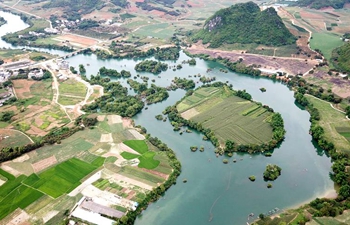
The United Nations special envoy to Yemen Martin Griffiths speaks during a press conference at the Sanaa International Airport in Sanaa, Yemen, on June 5, 2018. Martin Griffiths left the Yemeni rebel-held capital Sanaa on Tuesday after three days of talks with dominant Houthi rebels. (Xinhua/Mohammed Mohammed)
SANAA, June 5 (Xinhua) -- The United Nations (UN) special envoy to Yemen, Martin Griffiths, left the Yemeni rebel-held capital Sanaa on Tuesday after three days of talks with dominant Houthi rebels.
"Our talks with Houthi officials were fruitful," Griffiths told reporters at Sanaa airport. He declined to answer questions about any deal over handing over rebel-held Hodeidah port to the UN supervision.
"I have heard from many experts of their grave anxiety about an attack on Hodeidah and the significant and avoidable humanitarian consequences that would ensue. I am also concerned about the impact of such an attack on the political process," Griffiths said.
International humanitarian agencies have warned that an assault on Hodeida would be a major disaster to the densely populated port city and would block aid supplies to more than 20 million people.
On Monday, Griffiths met Houthi top official Mahdi al-Mashat, president of Houthi Supreme Political Council, to discuss possibilities of returning to the negotiation table with their foe government of exiled President Abd-Rabbu Mansour Hadi.
"We keep one hand on the trigger of a gun, while the other extends for peace," al-Mashat was quoted by state rebel-held Saba new agency as saying to Griffiths.
Al-Mashat told Griffiths that "any papers presented at the negotiating table should provide for ending the foreign presence in Yemen," in reference to the Saudi-led coalition forces backing Hadi's government.
According to Houthi-controlled Saba news agency, al-Mashat also told Griffiths that "respecting sovereignty and independence of countries should be a starting point for any political process and negotiations in Yemen."
"Yemen is with peace, the peace of brave, if there is a serious intention from the other parties," al-Mashat told Griffiths, stressing that the "coalition forces should first withdraw from all Yemeni territory before resuming talks."
Griffiths reviewed his efforts to bridge gap between the rival Yemeni parties. He told al-Mashat that he would brief the Security Council on his efforts and results on June 19.
Meanwhile, senior Houthi officials dismissed reports of any deal to hand over Hodeidah port to the UN supervision to avert the port city from future assault from the coalition forces, according to Saba.
Griffiths arrived on Saturday in Sanaa, amid heavy military escalation from both rival forces near the Red Sea port city of Houthi-held Hodeidah, the key target of the coalition.
Death toll has topped 100 from both Houthi rebels and forces backed by the Saudi-led coalition over the past three days in battles about few kilometres away from Hodeidah.
Hodeidah is the only lifeline route of supplying imports and humanitarian aid to the northern Yemen, which is under control of Iranian-allied Houthi movement.
Saudi-led coalition intervened in Yemen in March 2015 to roll back Shiite rebel gains and to restore President Hadi to Sanaa.
The war has killed over 10,000 people, mostly civilians, and forced 3 million out of their homes.















